By Trần Hoàng Nam
Ba Chẽ District in the northern province of Quảng Ninh has for a long time been known as a locality with great potential to develop eco-tourism in the northeastern region of the country.
Most of the total area of over 606sq.km is covered in mountains, with pristine forests, rivers, and waterfalls.
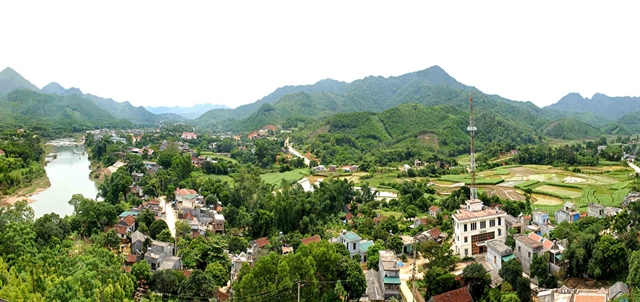
An aerial view of Ba Chẽ Town. — Photo bache.vn
The district is home to 27,430 people of various ethnic groups including the Dao, Tày, Hoa, Sán Chỉ and Cao Lan.
Since March 2016, the province has approved two main tourism routes in the district. The first one covers Ba Chẽ Town and Nam Sơn Commune (over 7km) while the second one links Thanh Sơn, Thanh Lâm and Đạp Thanh communes.
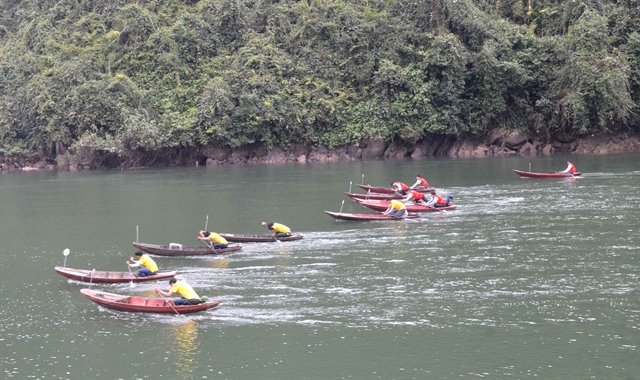
A boat race on a local river during the annual Miếu Ông, Miếu Bà festival. — Photo bache.vn
The first route focuses on spiritual tourism destinations like Miếu Ông, Miếu Bà (temples dedicated to the God and Goddess) and ancient ceramic kilns.
Tourists can also take a cruise on the Cổ Ngựa River.
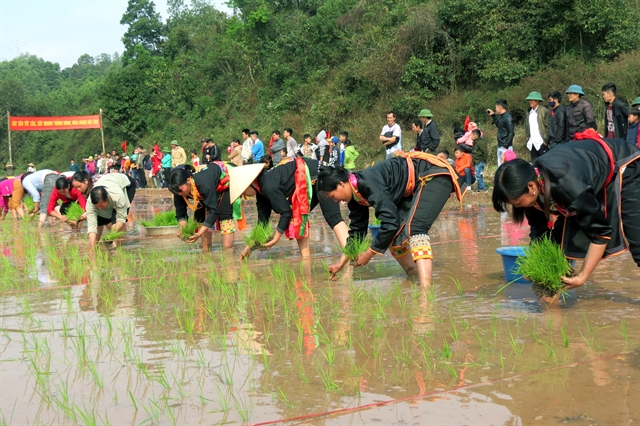
Dao ethnic minority people plant rice during a local Rice Planting Festival. — Photo baoquangninh.com.vn
The second route has been developed with eco-tourism in mind, offering experiences with local ethnic minority communities. Tourists can enjoy natural scenery at Khe Lạnh and Khe Lùng waterfalls in Thanh Sơn Commune; Dạ Village Communal House in Thanh Lâm Commune and the Golden Camellia farm in Đạp Thanh Commune.
“We want to develop tourism in an eco way, involving the local community,” Nguyễn Minh Sơn, chairman of the district’s People’s Committee, told Việt Nam News.
“We have tried our best to invest in building infrastructure for cultural spots, spiritual tourism sites and historical relic sites,” he said.
Since 2013, the district has implemented a project to preserve ethnic culture.
As many as six classes have been opened to train 240 learners various musical arts of ethnic minority groups, like the love duet singing of the Dao group; Soóng Cọ singing of the Sán Chỉ group; then singing and tính (lute) playing by the Tày group as well as a Dao language class.
As many as eight clubs of ethnic culture have been set up to maintain traditional culture.
Experimental model
Sơn said the authorities have chosen Sơn Hải Village in Nam Sơn Commune to set up a model for preserving traditional culture of Dao group to develop eco-tourism with community participation.
Later this year, a common house on stilts will be built to host community activities. The locality will resume Bàn Vương worship ceremony on the first day of the second lunar month (the ceremony is dedicated to the ancestor of the Dao group in the country) and maintain the traditional festival every year as the most important event for the Dao group.
“In the coming years, we plan to develop homestay models among the community,” Sơn said. “More plants and flowers will be planted to decorate the village. Other infrastructure facilities like docks, supporting buildings like public toilets and shops will be installed in the centre of the town.”
Sơn said other intangible cultural values of Dao group will be researched and recovered including folk singing and dancing, mediumship and dances over bonfires.
The district will make a documentary on traditional heritage of Dao group in the whole district and in Sơn Hải Village.
Sơn said in mid-June, the district hosted a workshop gathering scientists and cultural experts throughout the country to contribute to the project to preserve the Dao group’s culture with a link to tourism development.
At the workshop, researcher Hà Việt Quân from the Ethnic Groups Committee of the National Assembly, suggested including traditional herb therapy of the local Dao group and folk performances to entertain tourists, as well as souvenirs made by Dao people in the project.
Researcher Vũ Thị Hà, from the Việt Nam Museum of Ethnology, said the locality should exhibit objects involving Dao group’s culture in an open space to lure tourists.
Researcher Bế Trung Anh, deputy director of Ethnic Groups Academy, proposed to apply 4.0 technology in preserving traditional culture and advertise tourism. He also suggested introducing more local agricultural products during the tours.
Đặng A Mản, a local Dao man, said he hoped the project will be carried out soon.
“It will diversify the spiritual life of local Dao people, meet demands of locals in entertainment as well as better serve tourists,” he said.
According to Vũ Thị Thu Thủy, vice chairperson of Quảng Ninh People’s Committee, in order to make Sơn Hải Village in Nam Sơn Commune a popular destination linking routes in the province, local authorities have planned to invest in infrastructure and promote traditional culture.
“We have also gradually applied advanced methods in dealing with tourism in the area to impress visitors,” she said. “For instance, the local community should act as a key factor in the process.”
Local speciality
Golden Camellia flower is a special agricultural product of Ba Chẽ District. The plant initially grew wild in the local forest before locals discovered the flower’s value.
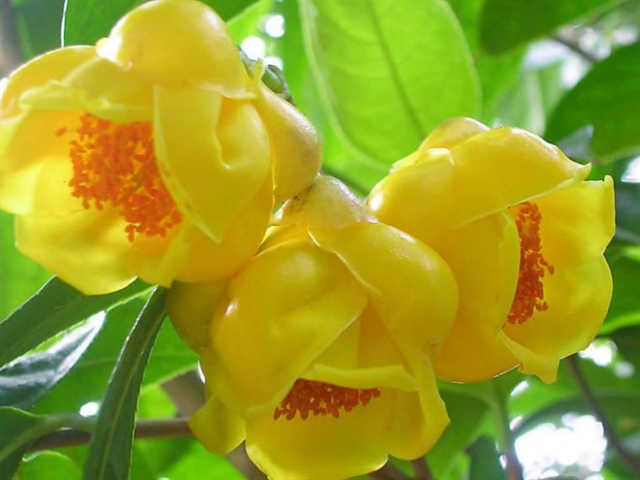
Golden camellia, a special product of Ba Chẽ District, has many good effects on health. — Photo vei.vn
Since 2016, the district has hosted a Golden Camellia Festival every two years to promote the flower, which fully blossoms in January and February. Many enterprises have visited the district to do research and invest in the production of the plant.
Đạp Thanh Forestry Products Company has been among the most successful enterprises in the district, which grows over 10,000 camellia bushes in its farm, harvests 200kg of dried flower with an income of VNĐ3 billion (US$128,000) per year.
Prof Trần Văn Ơn, a lecturer from Hà Nội University of Pharmacy confirmed that the flower has been used to treat foot and mouth disease.
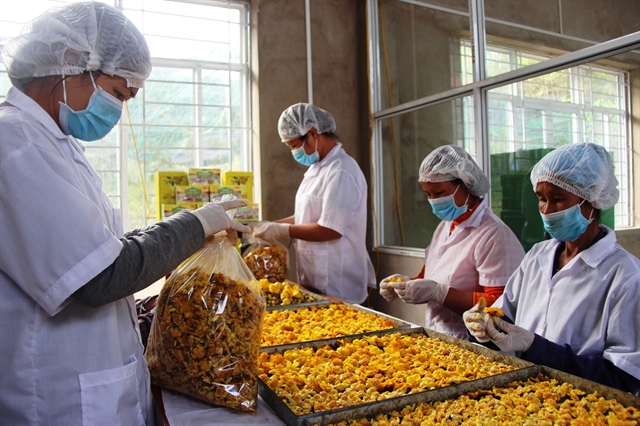
Workers pack golden camellia flowers for sale. — Photo baoquangninh.com.vn
“Because it can prevent certain viruses, the flower has been approved to moderate blood pressure, while its effect to reduce cholesterol is being researched,” he said.
"It can also act against some kinds of cancers," he said.
Chairman Sơn said local golden camellia tea has been licensed as a safe organic product meeting national standards for food hygiene and safety.
"We always welcome visitors to our district and hope to send local products back home with visitors throughout the country and even overseas," Sơn said. VNS